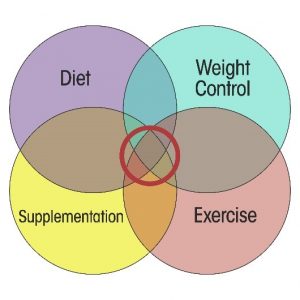Which Foods Have The Biggest Effect On Longevity?
Author: Dr. Stephen Chaney
 Everyone over 50 is searching for the elusive “Fountain Of Youth”.
Everyone over 50 is searching for the elusive “Fountain Of Youth”.
- We want to look younger.
- We want to feel younger.
- We want the energy we had in our 20s.
- We want to be rid of the diseases of aging.
The list goes on!
But how do we do that? Pills and potions abound that claim to reverse the aging process. Most just reverse your wallet.
- Should we train for marathons or bodybuilding contests?
- Should we meditate or do yoga to relieve stress?
- Should we get serious about losing weight?
- Should we get more sleep?
- Is there some miracle diet that can slow the aging process?
All the above probably slow the aging process, but the evidence is best for the effect of diet on aging. Several recent meta-analyses have looked at the effect of diet on the risk of premature deaths. In this issue of “Health Tips From the Professor” I review a study (LT Fadnes et al, PLoS Medicine, February 8, 2022) that combines the best of these meta-analyses into a single database and provides a provocative insight into the effect of diet on longevity.
How Was This Study Done?
 This study combined data from recent meta-analyses looking at the impact of various food groups on the risk of premature deaths with the Global Burden of Disease Study which provides population-level estimates of life years lost due to dietary risk factors.
This study combined data from recent meta-analyses looking at the impact of various food groups on the risk of premature deaths with the Global Burden of Disease Study which provides population-level estimates of life years lost due to dietary risk factors.
The authors then developed a new algorithm that allowed them to estimate how different diets affect sex- and age-specific life expectancy.
They divided the population into three different diet categories based on their intake of whole grains, vegetables, fruits, nuts, legumes, fish, eggs, dairy, refined grains, red meat, processed meat, white meat, sugar-sweetened beverages, and added plant oils. The diet categories were:
- Typical Western Diet (TW). This diet was based on average consumption data from the United States and Europe. This was their baseline.
- Optimal diet (OD). This diet is similar to a vegan or semi-vegetarian diet. However, it was not a purely vegan diet nor a purely semi-vegetarian diet. Instead, it represented the best diet people in this study were consuming.
- Feasibility diet (FA). This diet recognizes that few people are willing to make the kind of changes required to attain an optimal diet. It is halfway between the Typical Western Diet and the Optimal Diet.
To help you understand these diets based on the foods the study participants were eating, here are the comparisons in terms of daily servings:
| Food | TW Diet | FA Diet | OD Diet |
| Whole grains | 1.5 servings | 4.3 servings | 7 servings |
| Vegetables | 3 servings | 4 servings | 5 servings |
| Fruits | 2.5 servings | 3.75 servings | 5 servings |
| Nuts | 0 serving* | 0.5 serving* | 1 serving* |
| Legumes | 0 serving** | 0.5 serving** | 1 serving** |
| Fish | 0.25 serving | 0.5 serving | 1 serving |
| Eggs | 1 egg | 0.75 egg | 0.5 egg |
| Dairy | 1.5 servings | 1.25 servings | 1 serving |
| Refined grains | 3 servings | 2 servings | 1 serving |
| Red meat | 1 serving | 0.5 serving | 0 serving |
| Processed meat | 2 servings | 1 serving | 0 serving |
| White meat | 0.75 serving | 0.6 serving | 0 serving |
| Sugar-sweetened beverages | 17 oz | 8.5 oz | 0 oz |
| Added plant oils | 2 tsp | 2 tsp | 2 tsp |
*1 serving = 1 handful of nuts
**1 serving = 1 cup of beans, lentils, or peas
Using their algorithm, the authors asked what the effect on longevity would be if people changed from a typical western diet to one of the other diets at age 20, 60, or 80 and maintained the new diet for at least 10 years. The 10-year requirement is based on previous studies showing that it takes around 10 years for dietary changes to affect the major killer diseases like heart disease, cancer, or diabetes.
Finally, the authors improved the accuracy of their estimates of the effect of diet on longevity by taking into account the quality of each study included in their analysis. I will discuss the importance of this below.
Can Diet Add Years To Your Life?
The authors estimated that if people in the United States were to change from a typical western diet to an “optimal diet” and maintain it for at least 10 years,
…starting at age 20, men would live 13 years longer and women would live 10.7 years longer.
…starting at age 60, men would live 8.8 years longer and women would live 8 years longer.
…starting at age 80, both men and women would live 3.4 years longer.
But what if you weren’t a vegan purist? What if you only made half the changes you would need to make to optimize your diet? The news was still good.
The authors estimated that people in the United States were to change from a typical western diet to a “feasibility diet” and maintain it for at least 10 years,
…starting at age 20, men would live 7.3 years longer and women would live 6.2 years longer.
…starting at age 60, men would live 4.8 years longer and women would live 4.5 years longer.
…starting at age 80, both men and women would live ~2 years longer.
The authors concluded, “A sustained dietary change may give substantial health gains for people of all ages for both optimized and feasible [diet] changes. [These health gains] could translate into an increase in life expectancy of more than 10 years. Gains are predicted to be larger the earlier the dietary changes are initiated in life.”
Which Foods Have The Biggest Effect On Longevity?
 The algorithm the authors developed also allowed them to look at which foods have the biggest effect on longevity. The authors estimated when changing from a typical western diet to an optimal diet, the greatest gains in longevity were made by eating:
The algorithm the authors developed also allowed them to look at which foods have the biggest effect on longevity. The authors estimated when changing from a typical western diet to an optimal diet, the greatest gains in longevity were made by eating:
- More legumes, whole grains, and nuts, and…
- Less red and processed meat.
The authors concluded, “An increase in the intake of legumes, whole grains, and nuts, and a reduction in the intake of red meat and processed meats, contributed most to these gains [in longevity].”
However, this conclusion needs to be interpreted with caution. We also need to recognize that an “optimal diet” was defined as the best diet people in this study were eating. In addition, the effect of different foods on longevity depends on:
- The quality of the individual studies with that food, and…
- The difference in consumption of that food in going from a western diet to an optimal diet.
For example:
- Legumes, whole grains, nuts, red & processed meat made the list because the quality of data was high and the difference in consumption between the typical western diet and optimal diet was significant.
- The quality of data for an effect of fruits and vegetables was also high. For example, one major study concluded that consuming 10 servings a day of fruits and vegetables a day reduces premature death by 31% compared to consumption of less than 1 serving a day. However, the difference in consumption of fruits and vegetables between the western and optimal diets in this study was small, so fruits and vegetables didn’t make the list.
- Eggs and white meat didn’t make the list because the quality of data was low for those foods. Simply put, that means that there was a large variation in effect of those foods on longevity between studies.
- Other foods didn’t make the list because the quality of data was only moderate and/or the difference in intake was small.
So, the best way to interpret this these data is:
- This study suggests that consuming more legumes, whole grains, and nuts and less red & processed meats has a significant beneficial effect on health and longevity.
- Consuming more fruits and vegetables is likely to have a significant benefit on health and longevity, but you would need to consume more than people did in this study to achieve these benefits. In the words of the authors, “Fruits and vegetables also have a positive health impact, but, for these food groups, the intake in a typical Western diet is closer to the optimal intake than for the other food groups.”
- Other foods may impact health and longevity, but the data in this study are not good enough to be confident of an effect.
What Does This Study Mean For You?
 This study is the best of many studies showing the benefit of a more plant-based diet on health and longevity. It particularly encouraging because it shows:
This study is the best of many studies showing the benefit of a more plant-based diet on health and longevity. It particularly encouraging because it shows:
- You can achieve significant benefit by switching to a more plant-based diet late in life. You get the biggest “bang for your buck” if you switch at age 20. But even making the switch at age 60 or 80 was beneficial.
- You don’t need to be a “vegan purist”. While the biggest benefits were seen for people who came close to achieving a vegan or semi-vegetarian diet, people who only made half those changes saw significant benefits.
As I said above, this is a very strong study. However, the underlying data come from association studies, which can have confounding variables that influence the results.
For example, people who eat more plant-based diets tend to weigh less and exercise more. And both of those variables can influence longevity. Each study attempted to statistically correct for those variables, but they still might have a slight influence on the results.
However, I don’t see that as a problem because, in my view, a holistic approach is always best. As illustrated on the right, we should be seeking a lifestyle that includes a healthy diet, weight control, and exercise.
As for supplementation, both the vegan and semi-vegetarian diets tend to leave out whole food groups. Unless you are married to a dietitian, that means your diet is likely to be missing important nutrients.
The Bottom Line
A recent study asked whether changing from the typical western diet to a healthier, more plant-based diet could influence longevity. The results were very encouraging. The study showed that:
- Changing to a healthier diet could add up to a decade to your lifespan.
- The improvement in lifespan was greatest for those whose diets approached a vegan or semi-vegetarian diet, but a significant improvement in lifespan was seen for people who made only half those dietary improvements.
- The improvement in lifespan was greatest for those who switched to a healthier diet in their 20’s, but significant improvements in lifespan were seen for people who didn’t change their diet until their 60’s or 80’s.
In terms of the foods that have the biggest effect on longevity.
- This study suggests that consuming more legumes, whole grains, and nuts and less red & processed meats has a significant beneficial effect on health and longevity.
- Consuming more fruits and vegetables is likely to have a significant benefit on health and longevity, but you would need to consume more than people did in this study to achieve those benefits.
- Other foods may impact health and longevity, but the data in this study are not good enough to be confident of an effect.
The authors concluded, “A sustained dietary change may give substantial health gains for people of all ages for both optimized and feasible [diet] changes. [These health gains] could translate into an increase in life expectancy of more than 10 years. Gains are predicted to be larger the earlier the dietary changes are initiated in life.
An increase in the intake of legumes, whole grains, and nuts, and a reduction in the intake of red meat and processed meats, contributed most to these gains. Fruits and vegetables also have a positive health impact, but, for these food groups, the intake in a typical Western diet is closer to the optimal intake than for the other food groups.”
For more details about this study and what it means for you, read the article above.
These statements have not been evaluated by the Food and Drug Administration. This information is not intended to diagnose, treat, cure, or prevent any disease.

